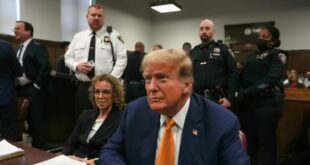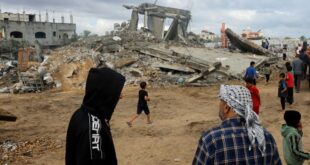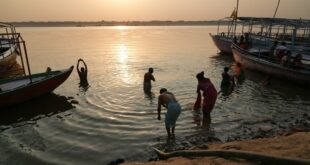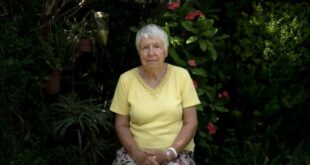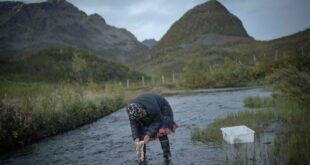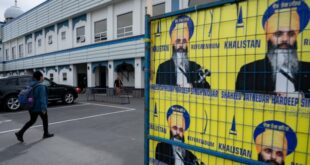The federal government suspended funding last week after UNRWA staff were accused of aiding Hamas
The federal government announced last week it was suspending "additional funding" for a UN agency that supports Palestinians in Gaza and employs about 13,000 people there, as well as another 17,000 in Palestinian refugee camps in Lebanon, the West Bank and elsewhere.
Ottawa took the step after Israel claimed staff members at the United Nations Relief and Works Agency for Palestine Refugees in the Near East (UNRWA) played a role in the Hamas attack in Israel on Oct. 7.
So what is UNRWA? What does it do? And why is it under pressure now?
UNRWA exists only to serve Palestinian refugees displaced in the 1948 and 1967 wars between Israel and its Arab neighbours, along with their descendants.
It is separate from the main UN refugee agency, the UN High Commissioner for Refugees (UNHCR), which deals with all non-Palestinian refugees in the world.
The United States helped to promote General Assembly Resolution 302(IV), which created UNRWA as a separate agency in 1949. UNRWA replaced the United Nations Relief for Palestine Refugees, an organization that was more focused on repatriating displaced Palestinians. By 1949, it had become clear that such a return was not likely to happen in the short term.
At the time, both Israel and the U.S. were in favour of separate treatment for Palestinian refugees. Israel did not want Palestinians to return to the homes they had left in 1948, but it did want to continue to settle Jewish refugees from Europe in Israel through the UNHCR, then called the International Refugee Organization.
Over time, Israel has come to regret that original position because UNRWA refugees are able to pass on their refugee status to their children. UNHCR refugees — about 80 per cent of the world's registered refugees — do not have that right.
Consequently, UNRWA has continued to serve the descendants of the original 700,000 refugees displaced in 1948 and the 300,000 displaced in 1967. Today, it provides health and educational services to 5.9 million Palestinian refugees in Gaza, the West Bank, Syria, Jordan and Lebanon.
About 13,000 of its total staff of 30,000 live in Gaza.
UNRWA's biggest single source of funding is the United States, which provided about a quarter of UNRWA's total budget of $1.6 billion US last year. Other major funding sources include the European Union, Germany, Japan, the United Arab Emirates, Saudi Arabia, Turkey and Sweden.
What is Canada's relationship with UNRWA?
Canada currently provides UNRWA with $25 million Cdn per year in regular baseline funding.
Under Prime Minister Stephen Harper, Canada suspended all funding to UNRWA in 2010, making Canada the only G7 country not to contribute.
In 2016, the Trudeau government restored the funding, though at a lower level than the $37 million annual contribution that existed prior to the Harper government.
In April 2017, Canada signed an agreement with UNRWA on oversight mechanisms and specified that $500,000 of its contribution should go to programs to teach principles of neutrality to UNRWA staff.
Singh presses Trudeau on UNRWA funding for Gaza
12 hours ago
NDP Leader Jagmeet Singh says Canada is not doing enough to help starving people in Gaza affected by the Israel-Hamas war after an investigation into the alleged role of some UNRWA employees in the Oct. 7 attack on Israel affected the group's aid funding earlier this week.
In 2018, when U.S. President Donald Trump agreed to Israel's request and cut his government's funding for UNRWA, other countries had to make up the shortfall. Canada contributed an additional $50 million.
Canada also provided $20 million in emergency funding to UNRWA in December 2023 to help it defray emergency costs associated with the current war, along with $40 million for other agencies working in Gaza.
Last week, Canada suspended both base and emergency funding for UNRWA after the Government of Israel accused 12 members of the agency's staff of 13,000 in Gaza of having played a role in the October 7 attacks by Hamas, or of being members of a militant organization, or both.
The federal government has said the funding will not be restored until an investigation of Hamas infiltration of UNRWA has concluded.
Canada's Permanent Representative to the UN Bob Rae told CBC's Power and Politics on Wednesday that UN Secretary-General Antonio Guterres assured him that there will be two investigations running concurrently.

UN secretary general urges countries to reconsider UNRWA funding withdrawal
10 hours ago
UN officials are meeting with member states who have suspended funding to its relief agency in Gaza. Canada is one of several countries which paused funding after some of UNRWA's staff were linked to the October 7 Hamas attack on Israel. Power & Politics hears from Bob Rae, Canada's ambassador to the UN, on how that conversation went.
The first, expected to take four weeks, will focus on the specific allegations about 12 UNRWA staff members. The second will be a longer, more in-depth review of all of UNRWA's operations and staffing.
It is not clear whether most countries will restore funding at the conclusion of the first investigation, or if some will insist on waiting for the second.
Several countries are due to make their next payment in February.
Canada last paid its regular contribution to UNRWA in March 2023 and is not due for another payment until late March to mid-April of this year. (The precise date depends on several factors, including the timing of the federal budget.)
If the investigation into the allegation of Hamas infiltration concludes to the federal government's satisfaction before then, the pause on funding for UNRWA's main operations — things like schools and clinics — could be lifted.
But the freeze on emergency funding may have an immediate effect. Some other aid agencies have said it is difficult for them to distribute aid in Gaza without UNRWA's help.
What are the allegations against UNRWA?
The Government of Israel has long complained about UNRWA and has sought to have the agency defunded.
It accuses UNRWA of perpetuating a Palestinian refugee crisis, allowing members of armed groups to infiltrate it and use its facilities, and allowing its schools to indoctrinate Palestinian children in an ideology of armed resistance to Israel.
UNRWA says it makes great efforts to avoid infiltration by armed groups and works to educate its employees about the importance of neutrality.
Israel has delivered a dossier to the UN and several national governments that accuses a dozen UNRWA staff of affiliation with Hamas or Palestinian Islamic Jihad.
An Israeli document detailing the allegations was obtained Monday by The Associated Press. It said seven UNRWA employees stormed into Israel on Oct 7, and that one of the seven took part in a kidnapping while another helped to steal a soldier's body. Three other UNRWA staff members are also accused of having supported the attacks in some manner.
Israel has accused ten UNRWA employees of having ties to Hamas and has claimed one is linked with the Islamic Jihad militant group, AP reported. Two of the 12 accused by Israel have been killed, according to the Israeli government document. The UN previously said one was still being identified.
The allegations could not be independently confirmed.
The UN says it will investigate the allegations and issue a report on its findings.
Though Israel has often accused UNRWA of indoctrinating children in Hamas ideology, Hamas has also accused UNRWA of corrupting Palestinian youth — for example, by running mixed-sex summer camps.
Hamas has been largely successful in diverting Gazan youth to its own summer programs, particularly since UNRWA has been unable to operate its own camps some years due to a lack of funds.
Who depends on UNRWA in Gaza?
About 60 per cent of people in Gaza are refugees who were displaced, or whose forebears were displaced, from other parts of mandate Palestine. UNRWA provides services to those people. The main food warehouses in Gaza are also operated by UNRWA.
The remaining 40 per cent are native Gazans, who are not normally covered by UNRWA.
UNRWA's largest program is education. It operates hundreds of schools that provide education to over half a million Palestinian children.
It also operates clinics and is the main health care provider for Palestinian refugees in Gaza.

Displaced Gazans worried over UNRWA funding pause
10 hours ago
After 13 of UNRWA's staff were accused of being involved in Hamas's Oct. 7 attacks against Israel, several nations have paused sending financial aid to the agency, which has displaced Gazans concerned about where they'll be getting their medication or next meal if UNRWA lacks the funding to continue operations.
Because of Gaza's isolation, rates of unemployment and poverty are high and a minority of Palestinian refugee families are considered "hardship cases" that receive additional food aid or cash from the agency. Hardship cases account for only about 6 per cent of all UNRWA-registered refugees.
Since the outbreak of war, many Gazan families that are not refugees and would not normally depend on UNRWA have been made homeless and destitute. Approximately 90 per cent of Gaza's population has been displaced.
The UN now says that 95 per cent of the people facing catastrophic famine conditions in the world are in Gaza.
The Israeli government appears to have been taken aback by the swift collapse of UNRWA funding.
Israeli media outlets are now quoting both civilian and military officials who say they never meant for UNRWA's funding to be suspended while the war was still underway.
"If UNRWA ceases operating on the ground, this could cause a humanitarian catastrophe that would force Israel to halt its fighting against Hamas," said one unnamed senior Netanyahu government official quoted by The Times of Israel on Wednesday. "This would not be in Israel's interest and it would not be in the interest of Israel's allies either."

Why top donors are bailing on UN's Gaza relief agency
2 days ago
Multiple countries, including the U.S. and Canada, have indefinitely paused their aid funding to UNRWA amid allegations from Israel that 12 of the relief agency's staff were involved in the Oct. 7 Hamas-led attack in Israel. Andrew Chang breaks down the allegations and what the pause in funding means for Palestinians in Gaza.
The official said that Israel does want to see UNRWA disbanded after the war, but not before.
"UNRWA is currently the international organization that plays the most dominant role in the entry and delivery of humanitarian aid into Gaza, and because there currently is no alternative, Israel is not pushing to shut down UNWRA."
An Israeli intelligence official told the same newspaper that some Hamas penetration of UNRWA was inevitable. "Hamas is obviously going to infiltrate an organization operating in an area under its control. It would be surprising if it wasn't the case," the official said.
The New York Times has reported that some Israel Defense Forces (IDF) commanders were unpleasantly surprised to learn that the civilian government was making its dossier about UNRWA public while the IDF is operating in Gaza and unable to take over the aid agency's responsibilities.
The Times said the IDF even started an internal investigation to trace the source of the information leak, which appeared to have originated with military intelligence before it was passed to the Wall Street Journal by an official in Israel's foreign ministry.
What happens next?
It's still not clear how severely the decision by several countries to temporarily suspend funding to UNRWA will affect its ability to deliver services.
UNRWA does not have a large contingency fund to tide it over, and says it will have to cease operations by the end of February unless funding is restored.
Some countries — Canada included — are not due to make their next payment for some time. The U.S. government says it has paid all but $300,000 of its annual regular contribution of $121 million. The next U.S. payment is not due until June. The U.S. has suggested that if the investigation into the allegation of Hamas infiltration can be concluded before then, it will restore funding.
Still, the suspension of emergency funding — which tends to come in unscheduled top-ups — can be expected to have an immediate effect on UNRWA's ability to feed Gazans.

Several countries, including Canada, have taken steps to replace their suspended emergency funding to UNRWA with contributions to other agencies. But those agencies do not have as much presence, infrastructure or experience in Gaza as UNRWA does.
Some donor countries, such as Jordan, have called for the urgent restoration of funding. Others, including Canada and the U.S., have said that restoration won't occur until Israel's allegations are thoroughly investigated.
But most countries that have suspended payments have said they intend to resume them once the investigation concludes and any resulting actions have been taken.
"We very much support the work that UNRWA does," U.S. State Department spokesperson Matthew Miller said Tuesday in a briefing. "We think it's critical. There is no other humanitarian player in Gaza who can provide food and water and medicine at the scale UNRWA does. We want to see that work continued."
UNRWA's investigations policy calls for most investigations to conclude within 40 days.
ABOUT THE AUTHOR

Senior Reporter
Evan Dyer has been a journalist with CBC for 25 years, after an early career as a freelancer in Argentina. He works in the Parliamentary Bureau and can be reached at evan.dyer@cbc.ca.
*****
Credit belongs to : www.cbc.ca
 MaharlikaNews | Canada Leading Online Filipino Newspaper Portal The No. 1 most engaged information website for Filipino – Canadian in Canada. MaharlikaNews.com received almost a quarter a million visitors in 2020.
MaharlikaNews | Canada Leading Online Filipino Newspaper Portal The No. 1 most engaged information website for Filipino – Canadian in Canada. MaharlikaNews.com received almost a quarter a million visitors in 2020.

